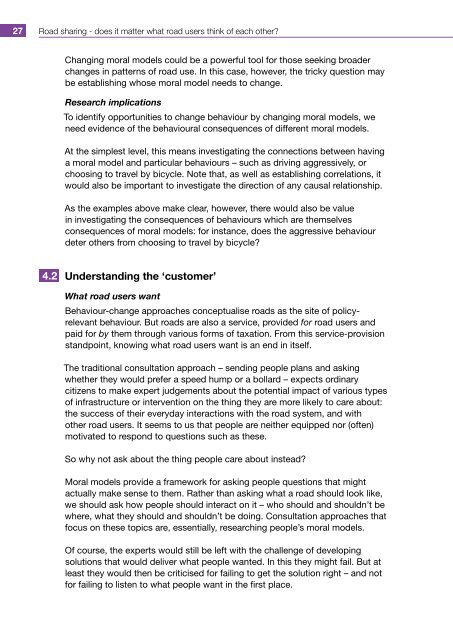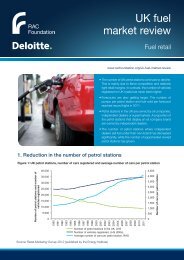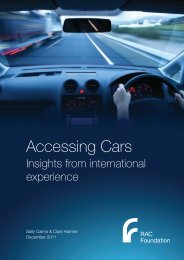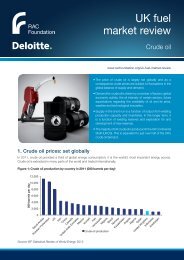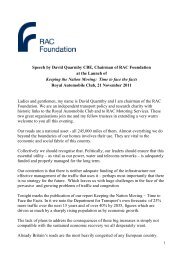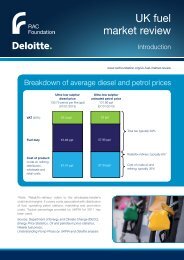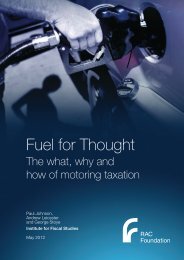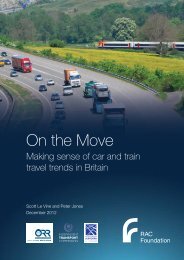Road sharing - does it matter what road users think of each other?
Road sharing - does it matter what road users think of each other?
Road sharing - does it matter what road users think of each other?
Create successful ePaper yourself
Turn your PDF publications into a flip-book with our unique Google optimized e-Paper software.
27<strong>Road</strong> <strong>sharing</strong> - <strong>does</strong> <strong>it</strong> <strong>matter</strong> <strong>what</strong> <strong>road</strong> <strong>users</strong> <strong>think</strong> <strong>of</strong> <strong>each</strong> <strong>other</strong>?Changing moral models could be a powerful tool for those seeking b<strong>road</strong>erchanges in patterns <strong>of</strong> <strong>road</strong> use. In this case, however, the tricky question maybe establishing whose moral model needs to change.Research implicationsTo identify opportun<strong>it</strong>ies to change behaviour by changing moral models, weneed evidence <strong>of</strong> the behavioural consequences <strong>of</strong> different moral models.At the simplest level, this means investigating the connections between havinga moral model and particular behaviours – such as driving aggressively, orchoosing to travel by bicycle. Note that, as well as establishing correlations, <strong>it</strong>would also be important to investigate the direction <strong>of</strong> any causal relationship.As the examples above make clear, however, there would also be valuein investigating the consequences <strong>of</strong> behaviours which are themselvesconsequences <strong>of</strong> moral models: for instance, <strong>does</strong> the aggressive behaviourdeter <strong>other</strong>s from choosing to travel by bicycle?4.2Understanding the ‘customer’What <strong>road</strong> <strong>users</strong> wantBehaviour-change approaches conceptualise <strong>road</strong>s as the s<strong>it</strong>e <strong>of</strong> policyrelevantbehaviour. But <strong>road</strong>s are also a service, provided for <strong>road</strong> <strong>users</strong> andpaid for by them through various forms <strong>of</strong> taxation. From this service-provisionstandpoint, knowing <strong>what</strong> <strong>road</strong> <strong>users</strong> want is an end in <strong>it</strong>self.The trad<strong>it</strong>ional consultation approach – sending people plans and askingwhether they would prefer a speed hump or a bollard – expects ordinaryc<strong>it</strong>izens to make expert judgements about the potential impact <strong>of</strong> various types<strong>of</strong> infrastructure or intervention on the thing they are more likely to care about:the success <strong>of</strong> their everyday interactions w<strong>it</strong>h the <strong>road</strong> system, and w<strong>it</strong>h<strong>other</strong> <strong>road</strong> <strong>users</strong>. It seems to us that people are ne<strong>it</strong>her equipped nor (<strong>of</strong>ten)motivated to respond to questions such as these.So why not ask about the thing people care about instead?Moral models provide a framework for asking people questions that mightactually make sense to them. Rather than asking <strong>what</strong> a <strong>road</strong> should look like,we should ask how people should interact on <strong>it</strong> – who should and shouldn’t bewhere, <strong>what</strong> they should and shouldn’t be doing. Consultation approaches thatfocus on these topics are, essentially, researching people’s moral models.Of course, the experts would still be left w<strong>it</strong>h the challenge <strong>of</strong> developingsolutions that would deliver <strong>what</strong> people wanted. In this they might fail. But atleast they would then be cr<strong>it</strong>icised for failing to get the solution right – and notfor failing to listen to <strong>what</strong> people want in the first place.


